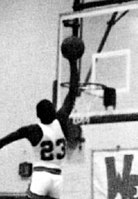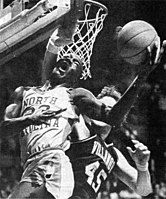Michael Jordan theme by hoopsbhoy4life
Download: MichaelJordan.p3t

(3 backgrounds)
Michael Jeffrey Jordan (born February 17, 1963), also known by his initials MJ,[9] is an American businessman and former professional basketball player. He played fifteen seasons in the National Basketball Association (NBA) between 1984 and 2003, winning six NBA championships with the Chicago Bulls. He was integral in popularizing basketball and the NBA around the world in the 1980s and 1990s,[10] becoming a global cultural icon.[11] His profile on the NBA website states, "By acclamation, Michael Jordan is the greatest basketball player of all time."[12]
Jordan played college basketball with the North Carolina Tar Heels. As a freshman, he was a member of the Tar Heels' national championship team in 1982.[5] Jordan joined the Bulls in 1984 as the third overall draft pick[5][13] and quickly emerged as a league star, entertaining crowds with his prolific scoring while gaining a reputation as one of the best defensive players.[14] His leaping ability, demonstrated by performing slam dunks from the free-throw line in Slam Dunk Contests, earned him the nicknames "Air Jordan" and "His Airness".[5][13] Jordan won his first NBA title with the Bulls in 1991 and followed that achievement with titles in 1992 and 1993, securing a three-peat. Following the murder of his father, Jordan abruptly retired from basketball before the 1993–94 NBA season to play Minor League Baseball in the Chicago White Sox organization, but returned to the Bulls in March 1995 and led them to three more championships in 1996, 1997, and 1998, as well as a then-record 72 regular season wins in the 1995–96 NBA season.[5] He retired for the second time in January 1999, returning for two more NBA seasons from 2001 to 2003 as a member of the Washington Wizards.[5][13] Jordan was selected to play for the United States national team during his college and NBA careers, winning four gold medals—at the 1983 Pan American Games, 1984 Summer Olympics, 1992 Tournament of the Americas and 1992 Summer Olympics—while also being undefeated.[15]
Jordan's individual accolades include six NBA Finals Most Valuable Player (MVP) awards, ten NBA scoring titles (both all-time records), five NBA MVP awards, ten All-NBA First Team designations, nine All-Defensive First Team honors, fourteen NBA All-Star Game selections, three NBA All-Star Game MVP awards, three NBA steals titles, and the 1988 NBA Defensive Player of the Year Award.[13] He holds the NBA records for career regular season scoring average (30.1 points per game) and career playoff scoring average (33.4 points per game).[16] In 1999, he was named the 20th century's greatest North American athlete by ESPN and was second to Babe Ruth on the Associated Press' list of athletes of the century.[5] Jordan was twice inducted into the Naismith Memorial Basketball Hall of Fame, once in 2009 for his individual career,[17] and again in 2010 as part of the 1992 United States men's Olympic basketball team ("The Dream Team").[18] He became a member of the United States Olympic Hall of Fame in 2009,[19] a member of the North Carolina Sports Hall of Fame in 2010,[20] and an individual member of the FIBA Hall of Fame in 2015 and a "Dream Team" member in 2017.[21][22] Jordan was named to the NBA 50th Anniversary Team in 1996 and to the NBA 75th Anniversary Team in 2021.[23] The trophy for the NBA Most Valuable Player Award is named in his honor.
One of the most effectively marketed athletes of his generation, Jordan made many product endorsements.[10][24] He fueled the success of Nike's Air Jordan sneakers, which were introduced in 1984 and remain popular.[25] He starred as himself in the live-action/animation hybrid film Space Jam (1996) and was the central focus of the Emmy-winning documentary series The Last Dance (2020). He became part-owner and head of basketball operations for the Charlotte Hornets (then named the Bobcats) in 2006 and bought a controlling interest in 2010, before selling his majority stake in 2023. He is also the owner of 23XI Racing in the NASCAR Cup Series. In 2016, he officially became the first billionaire player in NBA history.[26] That year, President Barack Obama awarded him the Presidential Medal of Freedom.[27] As of 2024, his net worth is estimated at $3.2 billion by Forbes.[28]
Early life[edit]
Michael Jeffrey Jordan was born at Cumberland Hospital in Brooklyn, New York City, on February 17, 1963,[29] to bank employee Deloris (née Peoples) and equipment supervisor James R. Jordan Sr.[29][30] He has two older brothers, James Jr. and basketball player Larry, as well as an older sister named Deloris and a younger sister named Roslyn.[31][32] Jordan and his siblings were raised in the Methodist faith.[33]
In 1968, the family moved to Wilmington, North Carolina.[34] Jordan attended Emsley A. Laney High School, where he highlighted his athletic career by playing basketball, baseball, and football. He tried out for the basketball varsity team during his sophomore year, but at a height of 5 feet 11 inches (1.80 m), he was deemed too short. His taller friend Harvest Leroy Smith was the only sophomore to make the team.[35][36] Motivated to prove his worth, Jordan became the star of Laney's junior varsity team and tallied some 40-point games.[35] The following summer, he grew four inches (10 cm) and trained rigorously.[36] Upon earning a spot on the varsity roster, he averaged more than 25 points per game (ppg) over his final two seasons of high school play.[37] As a senior, he was selected to play in the 1981 McDonald's All-American Game and scored 30 points,[38][39] after averaging 27 ppg,[37] 12 rebounds (rpg),[40][41] and six assists per game (apg) for the season.[41][42][43]
He was recruited by numerous college basketball programs, including Duke, North Carolina, South Carolina, Syracuse, and Virginia.[44] In 1981, he accepted a basketball scholarship to the University of North Carolina at Chapel Hill, where he majored in cultural geography.[45] He chose this field of study because of its relationship to meteorology, as he was interested in a career as a meteorologist.[46][47]
College career[edit]
As a freshman in coach Dean Smith's team-oriented system, Jordan was named ACC Freshman of the Year after he averaged 13.4 ppg on 53.4% shooting (field goal percentage).[48] He made the game-winning jump shot in the 1982 NCAA Championship game against Georgetown, which was led by future NBA rival Patrick Ewing.[49] Jordan later described this shot as the major turning point in his basketball career.[50][51] During his three seasons with the Tar Heels, he averaged 17.7 ppg on 54.0% shooting and added 5.0 rpg and 1.8 apg.[13]
Jordan was selected by consensus to the NCAA All-American First Team in both his sophomore (1983) and junior (1984) seasons.[52][53] After winning the Naismith and the Wooden College Player of the Year awards in 1984, Jordan left North Carolina one year before his scheduled graduation to enter the 1984 NBA draft. Jordan returned to North Carolina to complete his degree in 1986,[54] when he graduated with a Bachelor of Arts degree in geography.[55][56] In 2002, Jordan was named to the ACC 50th Anniversary men's basketball team honoring the 50 greatest players in ACC history.[57]
Professional career[edit]
Chicago Bulls (1984–1993; 1995–1998)[edit]
Early NBA years (1984–1987)[edit]
The Chicago Bulls selected Jordan with the third overall pick of the 1984 NBA draft after Hakeem Olajuwon (Houston Rockets) and Sam Bowie (Portland Trail Blazers). One of the primary reasons why Jordan was not drafted sooner was because the first two teams were in need of a center.[58] Trail Blazers general manager Stu Inman contended that it was not a matter of drafting a center but more a matter of taking Bowie over Jordan, in part because Portland already had Clyde Drexler, who was a guard with similar skills to Jordan.[59] Citing Bowie's injury-laden college career, ESPN named the Blazers' choice of Bowie as the worst draft pick in North American professional sports history.[60]
Jordan made his NBA debut at



